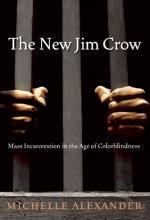Michelle Alexander: The New Jim Crow

Under slavery, millions of people were uprooted from their families, discriminated against, denied basic rights, and killed. Then slavery was outlawed, and under Jim Crow, millions of people were uprooted from their families, discriminated against, denied basic rights, and killed. Then overt race-based discrimination was outlawed, and now with the US criminal justice system, millions of people are uprooted from their families, discriminated against, denied basic rights, and killed. Absent cultural change, laws against discrimination don't end discrimination. They just change its form. In "The New Jim Crow: Mass Incarceration in the Age of Colorblindness," Michelle Alexander argues that the criminal justice system, particularly since the war on drugs, is the biggest civil rights challenge of our era.
The book is comprehensive. Alexander looks at every aspect of the criminal justice system and shows how it disparately effects people of color, particularly blacks, and how the courts have legalized those forms of discrimination and made them mostly immune to challenge. Blacks and whites tend to commit drug crimes at similar rates, but yet in some states black people constitute 80-90% of the prison population for drug crimes. Part of this has to do with laws: crack cocaine is punished much more heavily than powder cocaine, and federal laws financially incentivize local police departments to put their resources into arresting non-violent drug users rather than violent criminals. Part of this has to do with neighborhood policing: cops disproportionately patrol black neighborhoods. Part of it has to do with racialized policing at an individua level: cops disproportionately pull over, question, and arrest blacks, and it's legal for them to do this even when it's statistically proven to be race based and doesn't stop more crime than non-race-based policing. Part of this has to do with trials: prosecutors have more resources than public defenders, and sentences are harsh enough that even innocent people might plead guilty to get slightly more lenient treatment, and courts have ruled that it is illegal to investigate prosecutors for overt racism unless there is already evidence that they are being overtly racist (a real world catch 22!). Part of it has to do with jury selection: attorneys are allowed to use irrational excuses like "I didn't like that potential juror's hair" to exclude blacks from juries, and the large number of black felons excludes many more potential jurors. And there is much more that is messed up with the system and that Alexander examines in detail.
Let's assume that someone is actually guilty of a crime, though. Even after they are free from prison, it is now legal to discriminate against them. Felons are unable to get many public benefits like public subsidies for housing or food stamps, which means that many people can't find a place to sleep or anything to eat once they are released. Employers are allowed to discriminate against them, and many job credentials exclude felons, which means that it is structurally difficult for them to do legal work, which pushes felons towards illegal work. Felons, in most states, can't vote, or if they can, they have to do the equivalent of paying a poll tax. If all of the disenfranchised felons could vote, we would likely have had different presidental outcomes in 2000, 2004, and 2016 as well as in 7 senate races between 1980 and 2000. I believe in one person one vote, and I believe that our society has a responsibility to take care of all of its people, but black people are being systematically denied both voting rights and public benefits.
Despite clear evidence that this is systematic discrimination against black people, and despite clear evidence that this dramatically effects millions of lives as well as the health of our democracy, there is bipartisan support for expanding the criminal justice system in more or less its current form. This is because we are in an era of colorblindness. Even though race still matters a lot, it's a taboo subject. We're supposed to pretend that it doesn't matter. Any time someone talks about race or treats someone differently based on race, it's called racism even when it's an attempt to fix racism (eg, affirmative action). And when someone behaves in a way that is discriminatory based on race but they don't explicitly talk about race and instead talk about crime, it's okay for some reason.
Colorblindness doesn't work. We need to talk about race. We need to get people to care. If we only reform the prison system without getting people to understand that race is important, then all we'll get is another system that discriminates in a different way and that's even harder to pin down as being discriminatory. The book closes by quoting Baldwin: "This is your home, my friend, do not be driven from it; great men have done great things here, and will again, and we can make America what it must become." All of us, especially people with privilege, have a duty to make America what it must become.



